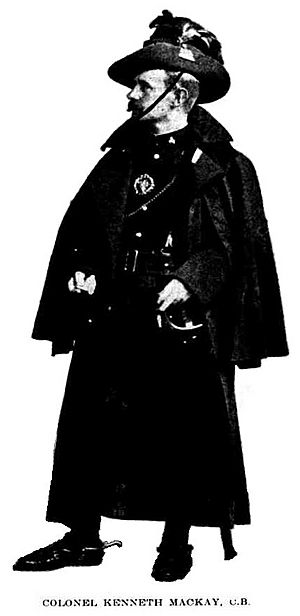Kenneth Mackay (Australian politician) facts for kids
Quick facts for kids
Major General
Kenneth Mackay
|
|
|---|---|

Colonel Kenneth Mackay (1901)
|
|
| Member of the New South Wales Legislative Council | |
| In office 18 October 1899 – 22 April 1934 |
|
| Member of the New South Wales Legislative Assembly for Boorowa |
|
| In office 24 July 1895 – 15 September 1899 |
|
| Preceded by | Thomas Slattery |
| Succeeded by | Niels Nielsen |
| Personal details | |
| Born | 5 June 1859 Wallendbeen, New South Wales |
| Died | 16 November 1935 (aged 76) Cootamundra, New South Wales |
| Political party | Protectionist Party |
| Military service | |
| Allegiance | Australia |
| Branch/service | New South Wales Military Forces (1885–01) Citizens Military Force (1901–20) |
| Years of service | 1885–1920 |
| Rank | Major-General |
| Commands | 1st Light Horse Brigade (1912–14) New South Wales Imperial Bushmen (1900) 1st Australian Horse (1897–00) West Camden Light Horse (1885–86) |
| Battles/wars | Second Boer War First World War |
| Awards | Companion of the Order of the Bath Officer of the Order of the British Empire Mentioned in Despatches Volunteer Officers' Decoration |
Major-General James Alexander Kenneth Mackay (born June 5, 1859 – died November 16, 1935) was an important Australian soldier and politician. He was often known as Kenneth Mackay. He received several awards for his service, including the Companion of the Order of the Bath (CB), Officer of the Order of the British Empire (OBE), and the Volunteer Officers' Decoration (VD).
Contents
Kenneth Mackay's Early Life
Kenneth Mackay was born on June 5, 1859, at Wallendenbeen station. This was a large farm near the town of Wallendbeen in New South Wales. He was the second son of Alexander Mackay, who was a farmer, and Annie Mackenzie.
He went to school at Camden College and Sydney Grammar School. After finishing school, he worked on his father's farm. His brother, Donald Mackay, became famous for flying planes to map out parts of central Australia.
In 1890, Kenneth Mackay married Mabel White. She came from Victoria and was part of a well-known farming family. Kenneth Mackay passed away in Cootamundra in 1935. He was survived by his wife and their two daughters, Annie Mabel Baldry and Agnes Jean.
Military and Political Career
Kenneth Mackay loved horses and even rode them in races as a hobby. His passion for horses led him to join the military volunteers in 1885. He helped create a group called the West Camden Light Horse. In 1886, he was given the rank of captain.
Forming the 1st Australian Horse
In 1897, he formed another military group called the 1st Australian Volunteer Horse Regiment. He was promoted to lieutenant colonel in 1898. This military group was so well-known that a Scottish-Australian poet named Will H. Ogilvie wrote two poems about them: The real Mackays! (1898) and Your chance, Mackays! (1899).
Serving in Politics
In 1895, Kenneth Mackay was chosen to be a member of the New South Wales Legislative Assembly. He represented the area of Boorowa until 1899. After that, he was appointed to the Legislative Council.
From September 1899 to April 1900, he held important government roles. He was the Vice-President of the Executive Council and the Representative of the Government in the Legislative Council.
Service in the Boer War
In 1900, Kenneth Mackay left his political roles to serve in the Second Boer War in South Africa. He commanded the 6th Imperial Bushmen's contingent from New South Wales. He fought in battles, including the Battle of Elands River. For his bravery, he was mentioned in official reports and was made a Companion of the Order of the Bath (CB). He also received the South African War Medal with four special clasps.
While he was in South Africa, he tried to become a member of the Australian Senate in the 1901 election, but he was not successful. He returned to Australia in July 1901.
Return to Politics and Military Promotions
In 1903, he returned to his political roles as Vice-President of the Executive Council and Representative of the Government in the Legislative Council. He served until 1904. He continued to be a member of the Legislative Council until 1934.
In 1912, he was promoted to colonel and then to brigadier. He also received the Volunteer Officers' Decoration. In 1915, he helped create plans for the Australian Army Reserve. The next year, in 1916, he became its first director-general.
Even though he was considered too old for active service overseas in World War I, he still played an important role. He was asked to investigate a disturbance involving soldiers at the Liverpool and Casula camps in 1916. In 1920, he was promoted to brigadier general and later retired as a major general. When he retired, he was also appointed an Officer of the Order of the British Empire.
Kenneth Mackay's Writings
Kenneth Mackay was also a writer. He published three books of poetry, which included poems about sports and life in the Australian bush. He also wrote two novels between 1887 and 1908.
His books include:
- Outback (published in 1893)
- The Yellow Wave (published in 1895)
- Across Papua
In 1896, he wrote a play called To the West. He worked on this play with another writer named Alfred Dampier. He also wrote poems like Sons of Britannia still we are (1898).
Images for kids
 | Lonnie Johnson |
 | Granville Woods |
 | Lewis Howard Latimer |
 | James West |


